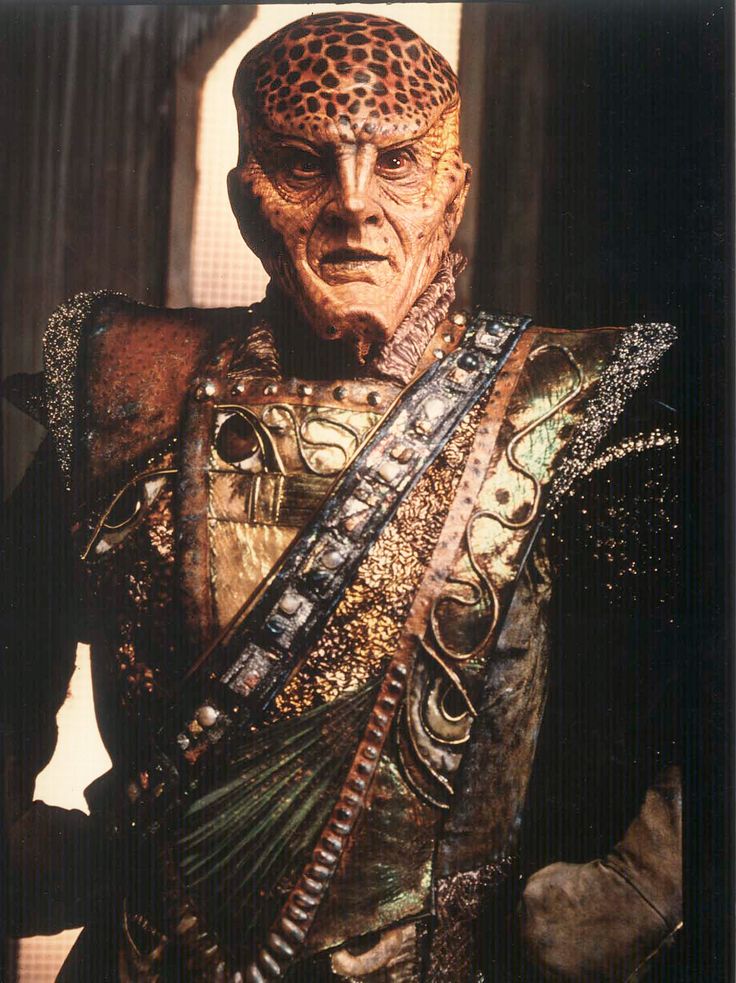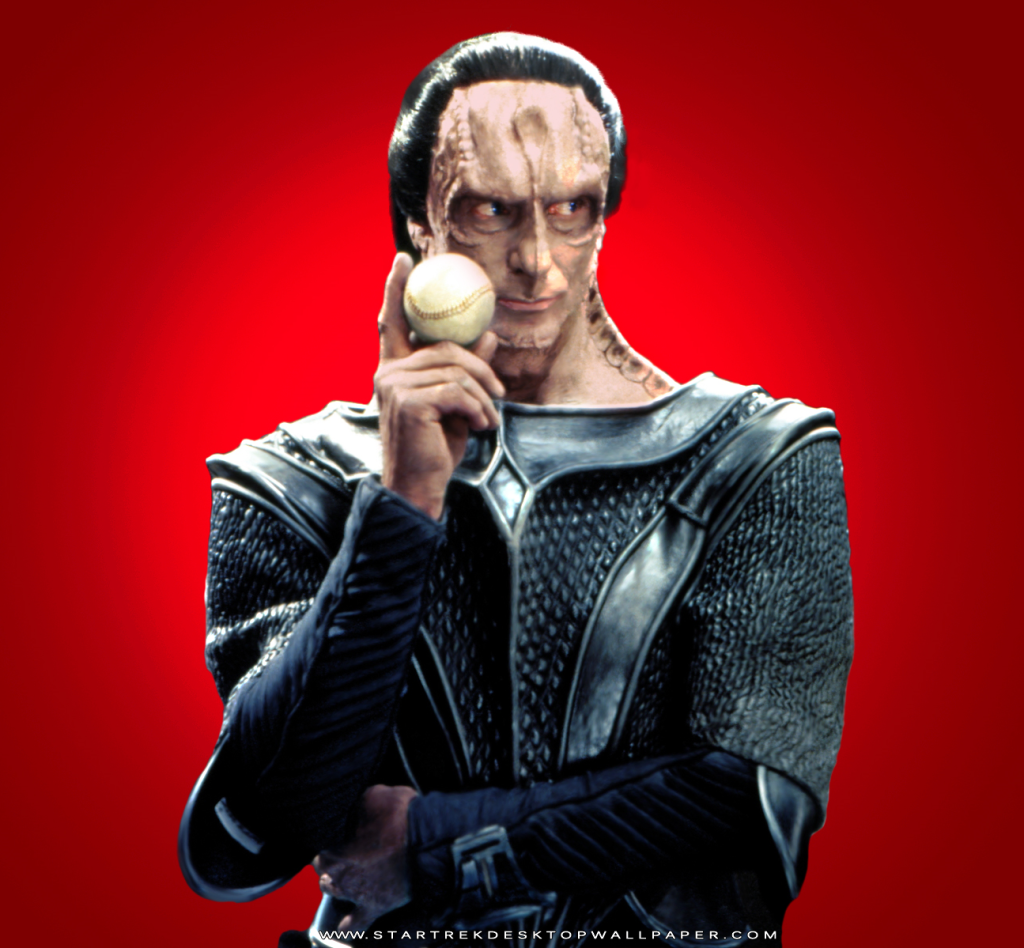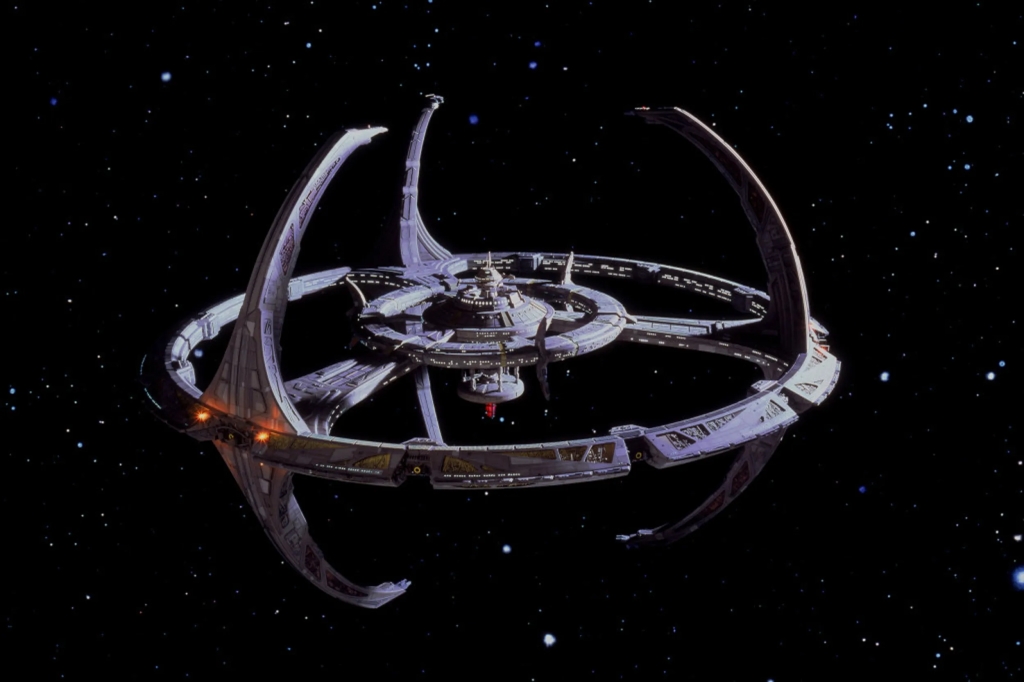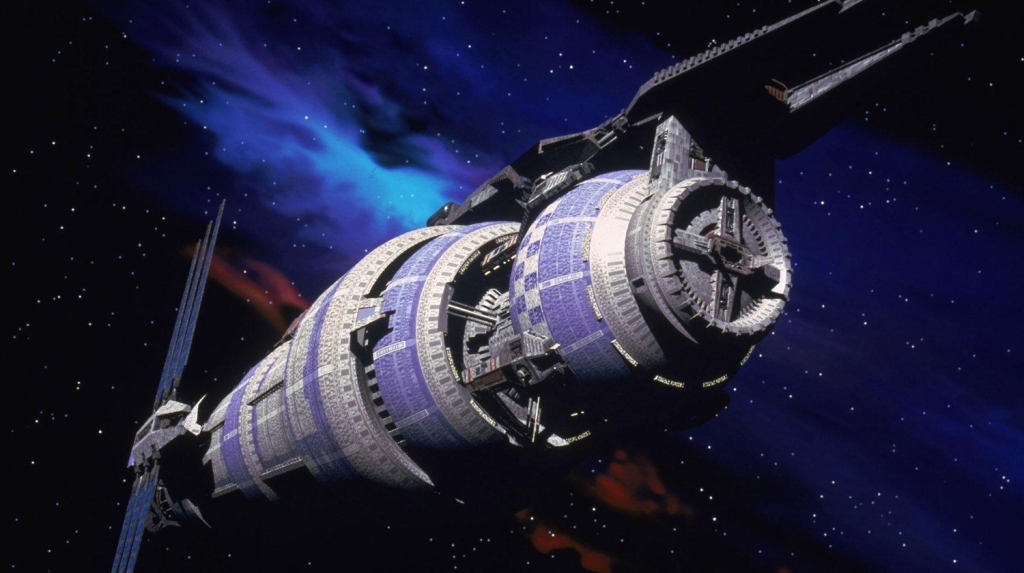

As a character, G’Kar can best be explained as the answer to the question: “What would Gul Dukat be like if he were as complex and nuanced as he thinks he is?”
Let’s unpack that a little.
Babylon 5 and Star Trek: Deep Space Nine were both science fiction television shows that aired during the 1990s. Both had similar premises–focusing on a space station that became the hub of interstellar diplomacy and intrigue. Both were really, really, really good shows. Because they were on at the same time, there were a friendly (and sometimes not-so-friendly) rivalry between their fans, with various accusations of plagiarism or imitation being thrown around. And, truth be told, there are a lot of similarities, though it’s not clear to me which way the inspiration ran. And one of the major similarities is between the characters of Gul Dukat (DS9) and G’Kar (B5). Both men are powerful figures within their respective nations–the Cardassian Union, for Dukat, and the Narn Regime, for G’Kar–who eventually rise to become leader of their people. Both are sort of weird lizard-aliens. Both are from aggressive, expansionist military-dominated states, seeking to challenge the status quo represented by our human protagonists. Both are clever, devious, tricky, and charming. Gul Dukat is the principal villain of Deep Space Nine, and G’Kar is, well that’s a little more complicated, but he is certainly presented as the main antagonist at first. But for all their similarities, their characters end up evolving in very different ways over the course of their respective shows, and help illustrate why both are such enduring classics of the genre.
Let’s talk about Gul Dukat to begin with. The thing about Dukat is that he’s not a very complicated character. This assertion may suprise some readers. After all, Dukat is rightly regarded as one of the best villains in Star Trek, and for many, “good character” is synonymous with “complex and nuanced.” And the character of Gul Dukat clearly thinks of himself as a sophisticated, complicated individual. Shortly before Deep Space Nine began, Dukat served as the final Cardassian Occupation Governor of the planet of Bajor, before they evacuated it in the face of intractable resistance, and Dukat remains deeply and sincerely embittered about his treatment by the Bajorans. Despite the fact that he oversaw an increase in rations and a decrease in executions and work quotas, the natives continued to resist him instead of hailing him as a savior. At one point, he angrily complains about the lack of statues built of grateful Bajorans, which he considers only his proper due.
Other Cardassian military leaders we meet often display a sort of brutish provincialism, a deep disinterest and contempt for the rest of the Galaxy. Dukat, on the other hand, clearly takes pride in his cosmopolitanism, his ability to understand the cultures of other species, and his rapport with his opponents. Most notably with Kira Nerys, the former Bajoran resistance officer turned second-in-command of Deep Space Nine, and Benjamin Sisko, the Starfleet captain sent to help Bajor navigate its post-Cardassian future, Dukat has a complex and ongoing relationship with both, one built of wary respect and mutual admiration, despite their enmity. Unlike his peers in the Cardassian military government, who follow orders without question and never question their culture, Gul Dukat is willing to go against the dictates of society when he feels he is correct. Most (in)famously, he recognized and formally adopted his illegitimate half-Bajoran daughter, Tora Ziyal, despite that doing this destroyed his career and relationship with his wife and legitimate children. In fact, Dukat has a long history of seeking out Bajoran lovers, despite Cardassian xenophobia and obsession with purity. Because of this, he was reduced to the captain of a freighter for a time, and later broke away from the Cardassians entirely. But in truth? All of this is a distraction at best, an outright lie at worst.
At heart, Dukat is a very simple man. Dukat worships Dukat, and everything else is secondary to that all-consuming egotism. He’s clever, yes, intelligent, yes, charming, yes, but that facade of culture and wit hides a genuinely empty soul, devoid of anything except the desperate desire for power. His relationships with Kira and Sisko are, we come to see, mostly one-sided, an illusion he’s convinced himself of. With Kira, especially, for all his claims of respect and admiration, it is nothing more than yet another desperate attempt to force a Bajoran–and this time, the character who truly represents everything that is best about Bajor–to acknowledge his many virtues. His care and concern for the Bajoran people was simply an attempt to foster the adulation he believes he deserves. His love for Bajoran women simply the desire of a conqueror to possess everything that he rules. Even his relationship with Ziyal, one of the few genuinely brave moments in his life, is truly about his own pride and ego, his belief that he is above any rule or law that could constrain him. He sees her mostly as an extension of himself, and is willing to sacrifice her the moment she turns against him. This all comes into focus in “Waltz” (DS9, S6, E11), when Sisko and Dukat are trapped together on a deserted planet. An amiable Dukat initially tries to convince Sisko of his good intentions and misunderstood past, before finally slipping into madness when challenged, and swearing vengeance against the entirety of the Bajoran people and all those who wronged him. It is the moment that the mask irretrievably slips.

But if Dukat is a character who eventually turns out to be a lot less complicated than he appears, than G’Kar is the opposite. In the Babylon 5 pilot, he is introduced as the series villain, a scheming, flamboyant diplomat constantly hatching plots to undermine Galactic peace. This characterization carries over into the first season–at least at first. Almost from the beginning, we start to see that G’Kar is a more complex character than we at first believed. In “By Any Means Necessary” (B5, S1, E12), G’Kar and his arch-rival, Londo Mollari, spar over control of a rare plant, needed for Narn religious rituals. While mostly a setup for a series of running jokes, it also teaches us that G’Kar takes his religion seriously. He is truly devoted to his beliefs. The next season, in “The Coming Of Shadows” (B5, S2, E09), G’Kar plots an assassination against the visiting Centauri emperor. It’s a typically treacherous plot–but we also see that he is sincerely ready to sacrifice his life for his people, for his nation, for his beliefs. Like the Cardassians, the Narn are aggressive and militaristic, but the more we learn about their history, and their long oppression by the Centauri, the more sympathetic they seem. In some ways, they are more like the Bajorans, a people long under the boot of another, now striking off into the Universe to make their own path.
Babylon 5 was a show most renowned for its long-running and intricate story arcs, and I won’t try and recount them all here. The war between the Centauri and the Narn erupts again, the Narn homeworld is conquered and subjected to a new, brutal occupation, G’Kar becomes leader of the government-in-exile and begins to lead a resistance movement. As the “Shadows” begin to make their presence more and more felt, G’Kar is one of the first characters to recognize the threat, drawing upon his deep knowledge of ancient scripture and religious doctrine. Right from the start, he is willing to put aside his rivalries and hatreds in the name of the greater good. And throughout all this, his relationship with the protagonists of the show shifts dramatically. From an opponent and enemy, he becomes recognized as an important ally, and eventually as a key moral voice, a spiritual leader who can speak for the voiceless. It’s tempting to call this a redemption arc, but it’s not, not really. Though G’Kar does change over the course of Babylon 5, the core aspects of his character remain the same; his spirituality, his devotion to his people, his commitment to his principles above all else. He is a man of unexpected depths. To quote Lois MacMaster Bujold’s novel Memory, when describing the Emperor Gregor: “It was impressive, a weight all around like deep seawater. You could drown in it, still trying to strike upward to the air.”
Dukat also has an arc as a spiritual leader, when he becomes leader of the Cult of the Pah-wraiths, but his commitment and faith soon prove weak. He has an affair with one of his parishioners, and then attempts to cover up his infidelity by forcing the cult members to commit mass suicide. For Dukat, it is always about Dukat. After the liberation of Narn, G’Kar is offered the position of dictator. He declines in anger, and when his spiritual following grows so large that it begins to form into a cult of personality, he leaves known space so that his people can develop without his overbearing influence. For Dukat, every avenue is about power, whether that was political power over the Cardassian Union or the Dominion, or the spiritual power that the Pah-wraiths offered. For G’Kar, everything is about his people and his faith. He is the closest thing you can imagine to an egoless man.
There is actually a Cardassian character in Deep Space Nine who’s complex and nuanced, but it’s not Dukat, but rather Damar. Gul Dukat’s second-in-command and loyal assistant, Damar is presented to us as someone with all of the Cardassian military’s vices and none of its virtues. He is brutal, xenophobic, arrogant, prideful–with none of Dukat’s wit or sophistication. But unlike Dukat, Damar evolves as a character and as a sentient being. He comes to understand that the Cardassian Union he’s know his whole life is unsustainable, and that the choices that he and Dukat made in allying with the Dominion have been a catastrophic failure. He turns his back on the values he holds most dear, reaches out a hand in friendship to his traditional enemies, and in the end, lays down his life fighting for the future of Cardassia.
I would argue that Gul Dukat is the best villain in the history of Star Trek, despite the essential simplicity of his character. You don’t need nuance or complexity to make a great character, and the fundamental brilliance of Dukat is that he is a man who has deluded himself. He has convinced himself that he is a fascinating, complicated figure with a rich set of ideals and beliefs, when he is actually an egomaniacal sociopath, willing to destroy the universe rather than let anyone else succeed at his expense. G’Kar, meanwhile, is probably one of the best characters I have ever seen on TV, and he achieves that through precisely the opposite approach. We are introduced to him as a comical, devious villain, and slowly watch as the deeper facets of his personality unfurl. We–and the human protagonists of Babylon 5–learn to appreciate his strengths, and see how much of what we saw as simple villainy could be seen as heroism from the perspective of the Narn. It works so well as an arc because everything is there from the start. Even as a villain, plotting the assassination of his fellow ambassadors, we still see his principles, his devotion, his sincerity, and we watch as he rises to the occasion, again and again.
These are both amazing feats of acting and character development, despite the very different approaches, and I think it serves as a fascinating little window into what amazing shows both Babylon 5 and Deep Space Nine really were, and how they turned what could have been cliche genre fiction into riveting and meaningful stories.

What an excellent breakdown! I watched the two shows with enough time separating them that I didn’t really see this parallel, but with the religious cult aspect especially, I think there’s a pretty good case to be made that the two shows were actually in dialogue here – and I think that your analysis of the different types of stories that they are telling is spot-on. Another thing I thing I think is radically different between the characters is that G’Kar has Londo to play off of, and Gul Dukat really has no equivalent foil. I think this works very well for what DS9 is doing – Dukat clearly thinks he has plenty of foils, in the fantasies of his own mind, and the degree to which no one actually cares about him, even in hatred, to the degree to which he feels entitled works really well. G’Kar, in contrast, becomes a more complicated character alongside Londo, who /also/ becomes a more complicated character, but in a completely different way and direction. Even when the two characters are not actually interacting with each other (and their actors have phenomenal chemistry when they are), there’s often a sort of a parallel structure between the two of them, and I think a big part of coming to understand both as the audience is watching how the two of them understand each other, and seeing those views evolve
LikeLiked by 2 people
Hadn’t thought about that aspect of it, but I think you’re right! G’kar’s relationship with Londo plays a HUGE role in how they both develop as characters, and Dukat’s lack of anything comparable is really telling. Even when he has a partner-in-crime, like Weyoun or Kai Winn, it’s never a particularly deep or complex relationship, and they spend most of their time just sniping at each other.
I definitely think there was SOME inspiration going back and forth between the two shows–they were on simultaneously, and there’s too many similarities to be coincidental, but it’s never been clear to me who was copying who lol.
Thanks for reading! 🙂
LikeLike
I think it’s less of a copying thing, and more of a dueling movies situation, like Antz and Bug’s Life. The first pitch was Babylon 5, I believe – so technically, you could argue that the bare premise is Star Trek copying Babylon 5. But after that, I think it clearly went both ways, and was as much commentary as copying – and I think both shows ended up better as a result!
LikeLiked by 1 person
IIRC, Straczynski first pitched Babylon 5 to Paramount, they turned him down, and then launched DS9 a few years later, which he sorta of implied he felt like they’d stolen the premise from him. But, tbh, it’s a pretty generic premise, and I think you’re right, the discourse between them improved them both a lot. While writing this I tried to figure out which show I liked better and decided that I couldn’t–they’re both so good, and they both do different things so well, that’s it’s hard to compare, even given all the similarities.
LikeLike